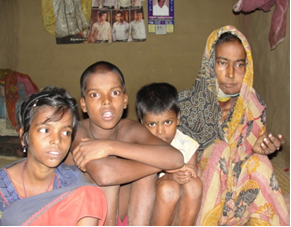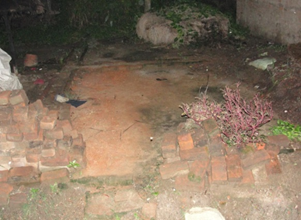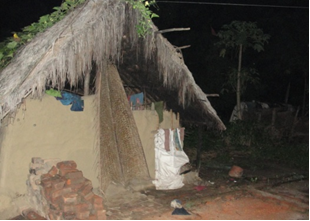INDIA: Government’s failure to ensure food and health security led to death of widow

Dear friends,
The Asian Human Rights Commission (AHRC) has received information that a widow, Ms. Sanjukta Sethi, died of sickness a few days ago in Puri, Orissa. She and her four children were suffering from a lack of food since her husband, the family bread earner, died of fever and energy deficiency about a month ago. Despite receiving a complaint letter dated 25 October 2011 asking for emergency relief for the family, the local administration has taken no action but for the fact that the officer from the Block Development Office visited the family. The Adivasi family has an AAY card that is meant to guarantee the food and health security of the poorest families, but benefited from no government schemes, except availing 35 kilograms of rice per month. Sanjukta’s eldest son was forced to migrate to Tamil Nadu to feed the family last month, while other family members depended on relatives and neighbours as they waited for him to return home with food. He came back home for funeral of his mother. The AHRC is disappointed by the state and local government’s complete neglect of their duty to ensure people’s freedom from hunger and starvation.
This case reminds us of Bhuje Naik’s case, which exposed the government’s denial of death from starvation associated with other sicknesses, and its attempt to cover up the reported case by providing assistance after death.
CASE NARRATIVE:

[photo] Late Ms. Sanjukta Sethi and her three children
Ms. Sanjukta Sethi, a 40-year-old widow died of cancer on 4 November 2011. She lived with her four children in Bogalai village, Banakhandi Gram Panchayat of Gop Block, Puri district, Orissa. Her husband, late Mr. Babaji Sethi died of sickness with fever and energy deficiency a month ago. Babaji tilled a half acre of farmland belonging to Lord Jagannatha Temple as a tenant, on which he managed food for his family when he was alive. Being an extremely poor tribal family, the family holds an AAY card issued to the poorest among the Below the Poverty Line (BPL) families. The family received 35 kilograms of rice per month accordingly.
After Ms. Sanjukta was diagnosed with cancer, Babaji had to do extra work as a daily labourer for her medical treatment. Hard labour aggravated Babaji’s health, and a lack of nutritious food heightened his energy deficiency, resulting in his death. He did not have any other specific disease, but could not afford to go to any medical institution when he got sick. His death led to desperation for his family, and a huge burden for his eldest son in particular. As no one could cultivate the small piece of land without Babaji, his eldest son Kabu (17-years-old) was forced to migrate to Tamil Nadu to seek food. The other children, Dipuna Sethi (son, 14-years-old), Laxmi Sethi (daughter, 12-years-old) and Saraswati Sethi (daughter, 8-years-old) go to school. Saraswati was found to have signs of leprosy, but the family has been unable to take her for any medical treatment so far.
Despite the family being confronted with such difficult conditions, the administration failed to provide them with any redress, or to uphold their constitutional rights to food, health, and a life with dignity. The National Family Benefit Scheme that provides immediate relief for a family who loses its bread earner with INR 10,000 (about 200 USD), the National Widow Pension that supports widows by providing INR 200 per month, and the Chief Minister Relief Fund targeting the poor who need immediate medical treatment; none of these have yet come to the family. Furthermore, the late Sanjukta never received any support as a mother who gave birth to two daughters under the government scheme Balika Samriddhi Yojana, or the maternal benefit scheme which entitles daughters to get scholarships for their education.
Meanwhile the family got some support from the children’s uncle Mr. Purnachandra Sethi, who is also a daily labourer as well as tilling one acre of farmland belonging to Lord Jagannatha Temple. However, Purnachandra has ten family members to look after, for which his income is not at all sufficient. Sanjukta’s family is not the only tribal family deprived of their basic rights.


[photo] Incomplete house
Earlier in 1999 when the Super Cyclone attacked the area, Babaji’s family received INR 5,000 under the housing scheme (IAY). He managed to build the foundation of his house but could not afford to complete it. His family have been living in a thatched house since then.
ADDITIONAL COMMENT:
The Constitution of India guarantees freedom from hunger and the right to food as a fundamental right, interpreted from the right to life with dignity, which has been institutionally strengthened and substantiated in Supreme Court Orders since 2005. However, the Indian government has consistently failed to ameliorate the poverty and food security of the most vulnerable group, the country’s indigenous people, known as Adivasis.
The major duty bearers in ensuring the right to food and other relevant rights are the state government and the district administration, according to national policies and the legal framework. As shown in this case however, existing policies fail to guarantee rights and in fact do not reach the poor who are starving, due to bureaucratic practice and prolonged negligence towards the vulnerable sections of society. There is no prompt mechanism to support the poor in immediate need of medical treatment or food.
In an earlier case of Bhuje Naik, an Adivasi widow who died of sickness and lack of nutritious food, it was observed that the government failed to provide her family with the benefits under available schemes and policies in time. After her death, Bhuje’s children were forcibly engaged in child labour to feed themselves. Later on, the children were separately sent to either school or social shelters for orphans, but one of them reportedly died. In response to the AHRC’s appeal, the government denied that the family suffered from a lack of food and starvation, instead emphasizing that Bhuje died of cancer. Furthermore, the government falsely stated that all assistance under relevant government schemes and policies had been provided to the family to the government’s best efforts. In fact, the children were only provided these after the death of their parents. Please visit the links to see the details of Bhuje’s case and the government’s response:
http://www.humanrights.asia/news/hunger-alerts/AHRC-HAC-002-2010
http://www.humanrights.asia/news/ahrc-news/AHRC-STM-042-2010
SUGGESTED ACTION:
Please write a letter to the government agencies below to express your concern about the children of late Ms. Sanjukta Sethi who are suffering from hunger. Please note that the government failed to provide redress to this poor family prior to Sanjukta’s death, and ensure that the government does not try to evade its responsibility again.
The AHRC is writing separately to the UN Special Rapporteur on the right to food.
To support this case, please click here: SEND APPEAL LETTER
SAMPLE LETTER
Dear __________,
INDIA: Call for responsibility and immediate relief to hungry and motherless tribal children
Names of the affected:
1. Ms. Sanjukta Sethi, 40-years-old, died of cancer and huger
2. Kabu Sethi, 17-years-old, eldest son of late Ms. Sanjukta, currently working in Tamil Nadu after Sanjukta died
3. Dipuna Sethi, 14-years-old, son of Ms. Sanjukta, in class 6
4. Laxmi Sethi, 12-years-old, daughter of Ms. Sanjukta, in class 5
5. Saraswati Sethi, 8-years-old, daughter of Ms. Sanjukta, in class 3, suffering signs of leprosy
Place of incident: Bogalai village, Banakhandi Gram Panchayat, Gop Block of Puri district, Orissa
Date of incident: early November
I am writing to express my deep concern about 40-year-old widow Ms. Sanjukta, who died of sickness suffering from hunger a few days ago on November 4, and the four children she left behind. I am surprised to learn that the administration, who received a complaint asking for immediate relief for the family dated October 25, 2011, prior to Sanjukta’s death, did not take any steps to assist the family. The government’s failure to provide any support or relief for this poor Adivasi family but the monthly 35 kilograms of rice as per their AAY card, even after the family lost their bread earner in October, contributed to Sanjukta’s death without any chance for medical treatment.
After looking into similar cases previously reported by the Asian Human Rights Commission (AHRC), I can only conclude that the government completely ignores the poorest of the poor belonging to the Adivasi groups. I am very well aware that the Constitution of India as well as Supreme Court Orders guarantees the right to food as a fundamental right, and substantiate it for its realisation. Yet, the state government as well as the administration fails to respect their Constitution and Supreme Court by denying the hunger of Adivasis, and failing to implement all available schemes and policies for them.
Prior to her death from cancer, Ms. Sanjukta Sethi lived with her four children in Bogalai village, Banakhandi Gram Panchayat of Gop Block, Puri district, Orissa. Her husband, late Mr. Babaji Sethi died of sickness with fever and energy deficiency a month ago. Babaji tilled a half acre of farmland belonging to Lord Jagannatha Temple as a tenant, on which he managed food for his family when he was alive. Being an extremely poor tribal family, the family holds an AAY card issued to the poorest among the Below the Poverty Line (BPL) families. The family received 35 kilograms of rice per month accordingly.
After Ms. Sanjukta was diagnosed with cancer, Babaji had to do extra work as a daily labourer for her medical treatment. Hard labour aggravated Babaji’s health, and a lack of nutritious food heightened his energy deficiency, resulting in his death. He did not have any other specific disease, but could not afford to go to any medical institution when he got sick. His death led to desperation for his family, and a huge burden for his eldest son in particular. As no one could cultivate the small piece of land without Babaji, his eldest son Kabu (17-years-old) was forced to migrate to Tamil Nadu to seek food. The other children go to school. Saraswati, the youngest daughter, was found to have signs of leprosy, but the family has been unable to take her for any medical treatment so far.
Despite the family being confronted with such difficult conditions, the administration failed to provide them with any redress, or to uphold their constitutional rights to food, health, and a life with dignity. The National Family Benefit Scheme that provides immediate relief for a family who loses its bread earner with INR 10,000 (about 200 USD), the National Widow Pension that supports widows by providing INR 200 per month, and the Chief Minister Relief Fund targeting the poor who need immediate medical treatment; none of these have yet come to the family. Furthermore, the late Sanjukta never received any support as a mother who gave birth to two daughters under the government scheme Balika Samriddhi Yojana, or the maternal benefit scheme which entitles daughters to get scholarships for their education.
Meanwhile, the family got some support from the children’s uncle Mr. Purnachandra Sethi, who is also a daily labourer as well as tilling one acre of farmland belonging to Lord Jagannatha Temple. However, Purnachandra has ten family members to look after, for which his income is not at all sufficient. Sanjukta’s family is not the only tribal family deprived of their basic rights.
I am further informed that earlier in 1999 when the Super Cyclone attacked the area, Babaji’s family received INR 5,000 under the housing scheme (IAY). He managed to build the foundation of his house but could not afford to complete it. His family have been living in a thatched house since then.
I recall an earlier case of Bhuje Naik, an Adivasi widow who died of sickness and lack of nutritious food, in which the government failed to provide her family with the benefits under available schemes and policies in time. After her death, Bhuje’s children were forcibly engaged in child labour to feed themselves. Later on, the children were separately sent to either school or social shelters for orphans, but one of them reportedly died. In response to the AHRC’s appeal, the government denied that the family suffered from a lack of food and starvation, instead emphasizing that Bhuje died of cancer. Furthermore, the government falsely stated that all assistance under relevant government schemes and policies had been provided to the family to the government’s best efforts. In fact, the children were only provided these after the death of their parents.
I worry that the government may issue a similar denial and false statement in this case as well. I urge you to pay immediate attention to the extremely poor living conditions of this family and take cognizance of the failure in providing all the available schemes and relief for the family in time. The government should not highlight the fact that Sanjukta died of cancer only to hide the starvation of the family. Instead of justifying its negligence, the government should look into the causes leading to the vicious cycle of poverty and starvation in which many Adivasi families are trapped, which eventually results in death. Furthermore, the government should improve access to its welfare schemes and policies, and ensure an available mechanism to provide immediate relief of medical treatment and food for those in dire conditions.
I look forward to your immediate response in this matter.
Sincerely yours,
---------------------------------------------------------------------
PLEASE SEND YOUR LETTERS TO:
1. Mr. Naveen Patnaik
Chief Minister
Naveen Nivas, Aerodrome Road
P.O.Bhubaneswar
751001 Orissa
INDIA
E-mail: cmo@ori.nic.in
2. Mr. B.K Patnaik
Chief Secretary, Panchayati Raj
Government of Odisha, Bhubaneswar
Odisha
INDIA
E-mail: csori@ori.nic.in
3. Arti Ahuja
Commissioner-cum-Secretary
Women and Child Development Department
Government of Odisha
INDIA
Fax: +91 674 2396 756
Email: wcdsec.or@nic.in
4. Mr. Santosh Sarangi, (IAS)
Commissioner-cum-Secretary
ST & SC Development, Minorities Backward Classes Welfare Department
Government of Odisha
Bhubaneswar, Odisha
INDIA
Fax: +91 674 2396806
E-mail: sarangi.santosh@gmail.com
5. Anu Garg
Commissioner-cum-Secretary
Department of Health and Family Welfare
Government of Odisha
INDIA
FAX: +91 674 240 0674
Email: orhealth@ori.nic.in
6. Collector
Collector & District Magistrate
Collectorate
Puri district
752001, Odisha
INDIA
FAX: +91 6752 223939
Email: dm-puri@nic.in
7. Prof. Shantha Sinha
Chairperson
National Commission for Protection of Child Rights
Government of India
5th Floor, Chanderlok Building, 36, Janpath
New Delhi - 110 001
INDIA
Fax: +91 11 23731584
Email: shantha.sinha@nic.in
8. Secretary
Orissa Human Rights Commission,
Toshali Bhawan(2nd Floor),Satyanagar,
PO:Satyanagar,
Bhubaneswar-751007
Odisha, INDIA
Fax: +91 674 257 2010
Email: ohrc@nic.in
Thank you.
Right to Food Programme (foodjustice@ahrc.asia)
Asian Human Rights Commission (ua@ahrc.asia)



